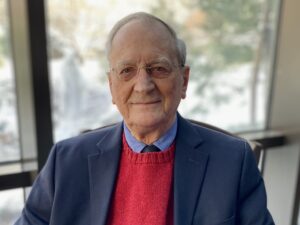
The Zero Theorem – “Zero must equal 100%”[1]. AI, Totalitarianism, and The Voluntary Path to Self-Enslavement: A Theological Perspective
The question of what philosophy and theology have to contribute to the development of AI has been a matter of scholarly debates. While AI entered common human lives almost abruptly and immediately, human adaptability proved impeccable: AI became a part of life as another commodity. In her contribution, Milja Radovic explores the possible downsides of AI from a theological point of view and asks the question: Is AI really for the benefit of humanity?

Das erste Jerusalem muss verteidigt werden
Ausgehend von Gedanken des Autors Dževad Karahasan zum „zweiten Jerusalem“ Sarajevo, spricht Christoph Novak über die Entmenschlichung als zentrale Problematik des Nahost-Konflikts und anderer Krisen und erinnert daran, dass der Kampf für Mitgefühl und Anerkennung des Anderen immer wieder aufs Neue geführt werden muss.

“Do you Hear the People Sing?”[1]. Cultural (Re)Interpretations and Reshaping Memory
In the world inter-wired through social media and AI, cultural reinterpretations and appropriations receive ever increasingly new meanings. Frequently cultural (re)interpretations and reshaping of historical memories form a dangerous mode for societal discourses. In this article Milja Radovic focusses on the Balkan Peninsula and considers it as one of the most important places in Europe where a dynamic processes through which communities reshape history, memory and culture takes place.

Der nächste Papst
Mit dem Tod von Papst Franziskus haben die Spekulationen über mögliche Nachfolger in den internationalen und nationalen Medien begonnen. Versucht man sich in Prognosen über potenzielle Nachfolgekandidaten des verstorbenen Papstes liegt die Aufgabe erstens darin, auf die Situation der Katholischen Kirche und die daraus sich ergebenden Diskurse über den Weg, den die Kardinäle beschreiten wollen, zu achten. Eine Analyse von Kurt Appel

Und jetzt? Der neue Papst vor dem Großinquisitor
„Die Wahl wird zwischen Betäubung und Prophezeiung liegen. Der göttliche Name, von dem uns die Zehn Worte gebieten, ihn nicht vergeblich zu benutzen, ist in den Mund der großen Verderbten zurückgekehrt….“ Ein kritischer Kommentar von Sergio Massironi. anlässlich der bevorstehenden Wahl des neuen Papstes.

The Year of Living Dangerously – In the land of raspberries and students –
Amid deepening political crises and societal fragmentation, the student uprisings in Serbia signal a resurgence of community and political engagement, challenging both local and global forces. In this contribution, Milja Radovic explores the theological dimensions of this movement, emphasizing that „being is communion“ and that transformation occurs through faith in action and ascetic praxis. Christian thought, she argues, can offer an antidote to apathy and isolation, fostering a communal life.

St. Ignatius, the Spiritual Exercises and the social sin of racism
Roger Haight’s theology has always been in a critical dialogue with how contemporary Westerners experience reality, while giving his theology a liberationist bent. This might be the reason for his more recent interest in facing racism, one of the painful scars of US-American history. A scar that seems to be torn open again by the announced policies of the current administration.

A wicked perspective on Butler’s „Frames of War. When Is Life Grievable?“
The new contribution of Tristan Genoske engages with the movie Wicked, in particular with the often overlooked song „No one mourns the wicked“. Yet its message is among the strongest. Was a life that no one mourned ever lived? Are there mechanisms of power that prevent us from mourning the dead? Who is wicked in our society and are we grieving them? Starting with Judith Butler’s text „Frames of War. When Is Life Grievable?“, the contribution tries to answer to these questions examining what is happening in Oz.

Unsichere Aussichten und Angst unter den Christen Syriens
Nach dem Sturz des Assad-Regimes Anfang Dezember 2024 ist die Zukunft Syriens weiterhin ungewiss. Anna Hager widmet sich in ihrem Beitrag der schwierigen Situation der christlichen Minderheiten im Land, die nach einer wechselvollen Geschichte heute besonders unsicher in die Zukunft blicken.

More Men, More Toxic Theology? Critical Questions on Being the Church from a Gen Z Theologian
In his article, J. J. Warren describes how the ever-increasing role of Generation Z in American society is causing fundamental shifts in the faith landscape, which also brings with it dangers for all those who are committed to an egalitarian church.